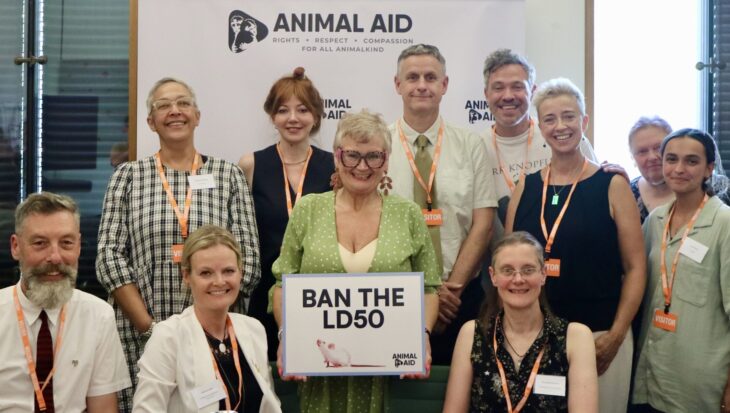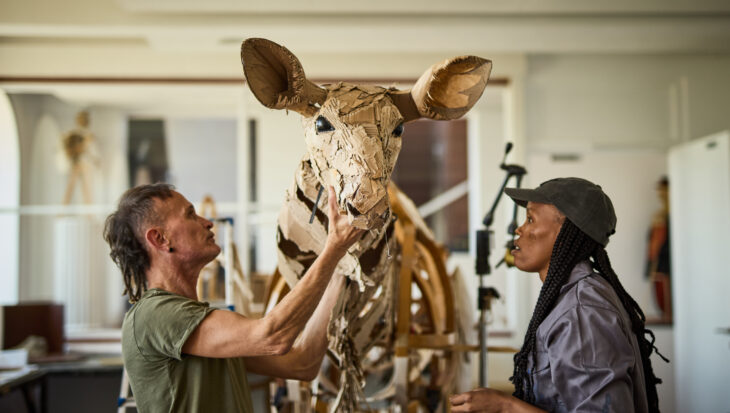Animal Aid in parliament to discuss ending animal tests
Yesterday, Animal Aid hosted a roundtable in Westminster, to meet with MPs and other invited guests to discuss the ending the LD50 and other animal tests.
Posted 02 Jul 2025

Posted on the 20th November 2014
The Association of Medical Research Charities (AMRC), the sector’s key representative body, has told its 133 members that, from November 20, they must publicly declare their support for vivisection if they wish to remain within its ranks.
The move has been condemned as ‘outrageously authoritarian’ by national campaign group Animal Aid because of the way it denies research funders the right to exercise their independent judgement on a highly contentious issue.
Expulsion from AMRC would come at a heavy price. Members enjoy the enhanced reputation and fundraising clout that derives from being part of a powerful, politically well-connected representative body. Specifically, the Association provides references for member charities seeking funding, as well as ‘opportunities for charities to work with industry and public funders’.
While the majority of current members do conduct or fund animal research, several have declared that they are not involved in animal use. From November 20, however, they will be required to post a statement on their websites in support of vivisection, or face expulsion from AMRC. Prospective new members will also be debarred unless they make the declaration.
AMRC has said that the pro-vivisection oath decision was taken at its 2013 AGM. But it has not indicated whether all member charities had a chance to vote, and if they were able to do so on the back of an informed debate during which both the pro and anti vivisection cases were put.
There are associated concerns relating to the pressure vivisection opponents are likely to have been under to vote in favour of the mandatory oath, given that their position is very much a minority one.
Animal Aid will this week write to all AMRC members urging them to challenge the oath decision and insist that each research charity, whatever its views on vivisection, should be able to decide its own position.
Animal use generates highly polarised opinions, with a significant proportion of the public objecting to the practice, not only because of the pain and suffering caused but also because of growing evidence indicating that data obtained from animals cannot be reliably applied to human medicine. On May 30, the British Medical Journal published a major article and an accompanying editorial that questioned the entire basis of animal use in disease research, drug development and safety testing.2
Animal Aid suspects AMRC’s demand for a public pro-vivisection oath is not unconnected with the growing impact of the pressure group’s Victims of Charity (VoC) campaign, launched in June 2011. Through its dedicated VoC website Animal Aid has revealed a series of appallingly cruel and medically invalid charity-supported experiments that have used dogs, pigs, sheep, monkeys, goats and rodents. Animals have been surgically mutilated, given heart attacks and electric shocks, brain-damaged and deprived of food and water. Thousands of site visitors have lodged complaints with the chief executives of the charities concerned.
AMRC has responded with a series of defensive manoeuvres, including literature and conference sessions dedicated to instructing members on how to deflect criticism. The size of the task faced by AMRC is clear from the findings of a 2011 NOP public opinion poll commissioned by Animal Aid. More than 80 per cent of respondents said that they would not knowingly donate to charities that fund animal research. The fact that vivisection-funding charities continue to attract millions of pounds each year points to a major gap in public knowledge, which Animal Aid is intent on bridging.
Says Animal Aid Director Andrew Tyler:
‘It is a mark of deep insecurity that AMRC is throwing its weight around by insisting on the swearing of a pro-vivisection public oath. While the pro-vivisection lobby is currently making great play of its professed commitment to “openness”, AMRC’s new dictatorial edict is designed to silence members who have doubts about animal research and close down the debate. This is an outrage considering that it is not just animal suffering that is at issue, but the growing doubts over the value of animal-based research to human medicine.’
Yesterday, Animal Aid hosted a roundtable in Westminster, to meet with MPs and other invited guests to discuss the ending the LD50 and other animal tests.
Posted 02 Jul 2025

Have you heard? A breathtaking arts initiative, ‘The Herds’ will be arriving in London this Friday.
Posted 27 Jun 2025
